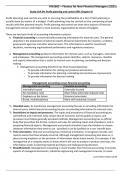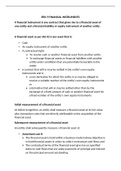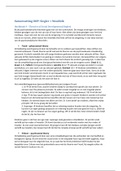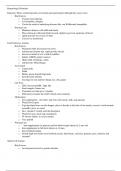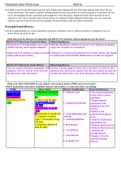LAIT A2
Section B:
When and where does a contract come into being:
A contract comes into being at the time when and place where agreement is reached. One can
stipulate the time and place contractually. In the absence of such a stipulation, one of three theories is
applicable, depending on the circumstances of the case.
1. Information or communication theory
When the offer is made by means of an instantaneous form of communication, e.g. telephonically
(landline or cellphone), the contract is concluded when the offeror is informed of the acceptance of the
offeree. The acceptance does not have to be made by telephone. It can be done by means of the post
(snail mail), as long as it is not an electronic means of communication. In other words: under SA law,
where A, in Stellenbosch, makes a telephonic offer to B, in Germany, on the 1 st of January, and B
accepts the offer by post, and the letter reaches Stellenbosch on 10 January, but is only read by A on
the 15th when he returns from vacation, the contract is concluded on 15 January as that is the day on
which A is informed of the acceptance of his offer, and the contract is concluded in SA.
2. The postal (or expedition) theory
In the case of a postal contract, where the offer is made by post (snail mail), the postal theory
determines that the contract comes into being at the time and place of posting the acceptance, unless
the offeror specifically states otherwise. In other words: the contract is concluded at the time and
place where the letter of acceptance is dispatched, which is normally indicated by means of the post
mark or stamp. If the offer is accepted by mailing a letter of acceptance from Germany, the contract is
concluded in Germany on the date that the letter is mailed.
The postal (or expedition) theory is applicable when the following requirements are met:
1. (a) the offer must be made by post and in the normal run of business;
2. (b) the transaction must be a commercial transaction;
3. (c) the acceptance must be made via the post; and
4. (d) the acceptance must not be addressed or posted incorrectly because of a mistake by the
acceptor and the postal services must be in proper working order.
The basis for the postal contract is an assumption, namely that the offeror had consented to the
acceptance being made at the time of posting. The scope of the postal theory is not clear. It is
probable that the postal theory also applies to telegrams, although there is some criticism towards this
approach. The postal theory does not apply to telephones. In S v Henkert 1981 (3) SA 445 (A) it was
ruled that telephones present a method of instantaneous communication, and that these contracts are
therefore covered by the information theory. The Supreme Court of Appeal in Jamieson v Sabingo
2002 (4) SA 49 (SCA)37 also ruled that telex and telefax communication should be treated similarly to
telephone communication and that the information theory would therefore apply. Note, however, that
this case was heard before the ECTA came into operation. 38
In the case of a postal contract, the withdrawal of an acceptance or the rejection of an offer is
problematic, especially when a faster means of communication is used for the withdrawal or rejection.
For instance: A sends an offer in the post to B. B accepts it by post. B then changes his mind. He
sends a rejection with a faster medium of communication, such as e- mail. Or B rejects an offer by
mail. However, thereafter he sends an acceptance with a faster medium, which reaches A before the
, rejection does. In the first scenario, strictly speaking, the contract was concluded when the letter of
acceptance was placed in the mailbox. However, on grounds of public policy and fairness, the
withdrawal will be allowed unless there is some detriment to the offeror. The same applies to the
second scenario.
3. Receipt Theory
Where the offer or the acceptance, or both, is made by means of an electronic means of
communication, (e.g. e-mail, SMS or other electronic data message), the situation is regulated by the
Electronic Communications and Transactions Act (ECTA) 25 of 2002. Section 22 of this Act stipulates
that a contract is concluded when the acceptance of the offer (in the form of an electronic data
message) is received by the offeror. “Received”, in turn, means that the data message has entered an
information system and is capable of being retrieved by the addressee 39 (s 23(b)). The Act also
provides that the message is deemed to be accepted at the usual place of business or residence of
the addressee. In other words: even if the acceptance is read at an internet café or abroad, it will still
be deemed that the contract is concluded at the usual place of business or residence of the offeror. It
is also irrelevant when the message is read since the Act is based on the receipt theory. The date on
which the message is received in the offeror’s inbox will be the date on which the contract is
concluded. This would mean that the contract could technically be concluded without the offeror’s
knowledge. Problems could thus arise where the network or computer software malfunctions,
especially where the acceptance of the offer is linked to a particular date. However, these are
problems that are experienced in the context of the postal theory as well.
Contracts that are concluded during video conferences or in chatrooms on the internet are for all
practical purposes treated similarly to instantaneous communication methods and, therefore, similarly
to contracts concluded by telephone.
Because the users of electronic means of communication can be anywhere in the world when data
messages are exchanged, the parties are advised to agree on where and when the contract has been
concluded and to indicate that in the contract, especially where an international contract is concluded.
Note, however, that the above rules are merely default rules and that the parties to a contract can
agree to deviate from them through agreement, e.g. they can agree that the contract will be concluded
when the actual order is executed and not when the acceptance is received. Also, when it comes to
electronic communication, the validity of these types of communication may be placed in dispute as
countries may differ on how they treat these forms of communication on the same basis. Efforts have
been made to harmonise legal systems as regards their approach to electronic communication, and
many countries have based their national legislation on the basis of the UNCITRAL Model Law on
Electronic Commerce.40
Breaches of Contract:
1. Repudiation
Repudiation occurs where a person creates the objective impression that he is not going
to perform in accordance with the contract. For example, by denying the validity of a
contract or disputing its terms; resiling from a contract without valid grounds; giving
insufficient notice of cancellation; or notifying a co-contractant that you cannot perform.
Repudiation may take place both before or after the time when performance must take
place.
The question is not whether a person subjectively intended to comply with the contract
but whether he created the objective impression that he is not going to perform; i.e.
whether it is reasonable in the circumstances to infer from his conduct that he will not
comply. In Tuckers Land and Development v Hovis 1980 1 SA 654 (A), plots were sold in a
new town development. Hovis bought a plot from a plan in an area that was originally
demarcated for residential purposes. However, this particular set of plans was rejected
by the authorities concerned, resulting in the town planners having to go back to their
drawing boards. The second set of plans was subsequently approved. However, on this
Section B:
When and where does a contract come into being:
A contract comes into being at the time when and place where agreement is reached. One can
stipulate the time and place contractually. In the absence of such a stipulation, one of three theories is
applicable, depending on the circumstances of the case.
1. Information or communication theory
When the offer is made by means of an instantaneous form of communication, e.g. telephonically
(landline or cellphone), the contract is concluded when the offeror is informed of the acceptance of the
offeree. The acceptance does not have to be made by telephone. It can be done by means of the post
(snail mail), as long as it is not an electronic means of communication. In other words: under SA law,
where A, in Stellenbosch, makes a telephonic offer to B, in Germany, on the 1 st of January, and B
accepts the offer by post, and the letter reaches Stellenbosch on 10 January, but is only read by A on
the 15th when he returns from vacation, the contract is concluded on 15 January as that is the day on
which A is informed of the acceptance of his offer, and the contract is concluded in SA.
2. The postal (or expedition) theory
In the case of a postal contract, where the offer is made by post (snail mail), the postal theory
determines that the contract comes into being at the time and place of posting the acceptance, unless
the offeror specifically states otherwise. In other words: the contract is concluded at the time and
place where the letter of acceptance is dispatched, which is normally indicated by means of the post
mark or stamp. If the offer is accepted by mailing a letter of acceptance from Germany, the contract is
concluded in Germany on the date that the letter is mailed.
The postal (or expedition) theory is applicable when the following requirements are met:
1. (a) the offer must be made by post and in the normal run of business;
2. (b) the transaction must be a commercial transaction;
3. (c) the acceptance must be made via the post; and
4. (d) the acceptance must not be addressed or posted incorrectly because of a mistake by the
acceptor and the postal services must be in proper working order.
The basis for the postal contract is an assumption, namely that the offeror had consented to the
acceptance being made at the time of posting. The scope of the postal theory is not clear. It is
probable that the postal theory also applies to telegrams, although there is some criticism towards this
approach. The postal theory does not apply to telephones. In S v Henkert 1981 (3) SA 445 (A) it was
ruled that telephones present a method of instantaneous communication, and that these contracts are
therefore covered by the information theory. The Supreme Court of Appeal in Jamieson v Sabingo
2002 (4) SA 49 (SCA)37 also ruled that telex and telefax communication should be treated similarly to
telephone communication and that the information theory would therefore apply. Note, however, that
this case was heard before the ECTA came into operation. 38
In the case of a postal contract, the withdrawal of an acceptance or the rejection of an offer is
problematic, especially when a faster means of communication is used for the withdrawal or rejection.
For instance: A sends an offer in the post to B. B accepts it by post. B then changes his mind. He
sends a rejection with a faster medium of communication, such as e- mail. Or B rejects an offer by
mail. However, thereafter he sends an acceptance with a faster medium, which reaches A before the
, rejection does. In the first scenario, strictly speaking, the contract was concluded when the letter of
acceptance was placed in the mailbox. However, on grounds of public policy and fairness, the
withdrawal will be allowed unless there is some detriment to the offeror. The same applies to the
second scenario.
3. Receipt Theory
Where the offer or the acceptance, or both, is made by means of an electronic means of
communication, (e.g. e-mail, SMS or other electronic data message), the situation is regulated by the
Electronic Communications and Transactions Act (ECTA) 25 of 2002. Section 22 of this Act stipulates
that a contract is concluded when the acceptance of the offer (in the form of an electronic data
message) is received by the offeror. “Received”, in turn, means that the data message has entered an
information system and is capable of being retrieved by the addressee 39 (s 23(b)). The Act also
provides that the message is deemed to be accepted at the usual place of business or residence of
the addressee. In other words: even if the acceptance is read at an internet café or abroad, it will still
be deemed that the contract is concluded at the usual place of business or residence of the offeror. It
is also irrelevant when the message is read since the Act is based on the receipt theory. The date on
which the message is received in the offeror’s inbox will be the date on which the contract is
concluded. This would mean that the contract could technically be concluded without the offeror’s
knowledge. Problems could thus arise where the network or computer software malfunctions,
especially where the acceptance of the offer is linked to a particular date. However, these are
problems that are experienced in the context of the postal theory as well.
Contracts that are concluded during video conferences or in chatrooms on the internet are for all
practical purposes treated similarly to instantaneous communication methods and, therefore, similarly
to contracts concluded by telephone.
Because the users of electronic means of communication can be anywhere in the world when data
messages are exchanged, the parties are advised to agree on where and when the contract has been
concluded and to indicate that in the contract, especially where an international contract is concluded.
Note, however, that the above rules are merely default rules and that the parties to a contract can
agree to deviate from them through agreement, e.g. they can agree that the contract will be concluded
when the actual order is executed and not when the acceptance is received. Also, when it comes to
electronic communication, the validity of these types of communication may be placed in dispute as
countries may differ on how they treat these forms of communication on the same basis. Efforts have
been made to harmonise legal systems as regards their approach to electronic communication, and
many countries have based their national legislation on the basis of the UNCITRAL Model Law on
Electronic Commerce.40
Breaches of Contract:
1. Repudiation
Repudiation occurs where a person creates the objective impression that he is not going
to perform in accordance with the contract. For example, by denying the validity of a
contract or disputing its terms; resiling from a contract without valid grounds; giving
insufficient notice of cancellation; or notifying a co-contractant that you cannot perform.
Repudiation may take place both before or after the time when performance must take
place.
The question is not whether a person subjectively intended to comply with the contract
but whether he created the objective impression that he is not going to perform; i.e.
whether it is reasonable in the circumstances to infer from his conduct that he will not
comply. In Tuckers Land and Development v Hovis 1980 1 SA 654 (A), plots were sold in a
new town development. Hovis bought a plot from a plan in an area that was originally
demarcated for residential purposes. However, this particular set of plans was rejected
by the authorities concerned, resulting in the town planners having to go back to their
drawing boards. The second set of plans was subsequently approved. However, on this

